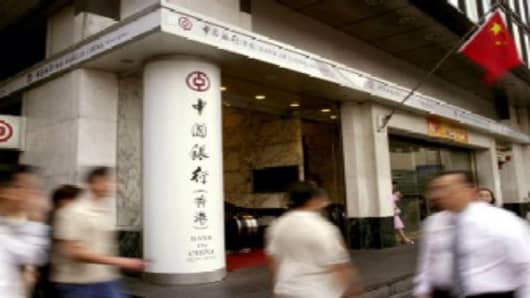The negative sentiment that overshadowed China's banks earlier this year is fading and the sector is poised for strong gains in 2013, while brighter economic prospects should fuel a rally in Japanese bank shares, analysts tell CNBC.
Better-than-expected third quarter earnings results have helped shares in big Chinese banks recover some ground from losses earlier this year amid worries that non-performing loans would balloon with a slowing economy and hurt profits.
Still, Chinese banks remain relatively cheap and they should be able to maintain their earnings into the New Year, said David Marshall, senior analyst of Asia-Pacific Financials with research firm CreditSights.
"When you look at how negative the sentiment has been towards the banks, it seems to me there's some potential for uplift in terms of the valuations," Marshall told CNBC Asia's "Squawk Box" on Wednesday. "Relative to their earnings, multiples are still very low."
Bank of China, Industrial and Commercial Bank of China, China Construction Bank and Agricultural Bank of China are now 19.6 percent, 19.7 percent, 14.6 percent and 11.1 percent higher on the year respectively and are trading at multiples of under 8 times current year's earnings. The Shanghai Composite Index in contrast has edged up half a percent.
And with the Chinese economic growth forecast by economists to rebound to 8 percent in 2013, after expanding an estimated 7.5 percent this year, which would mark the slowest pace since 1999, banks could perform "reasonably well," Marshall said.
(Read more :
"I think we will see some profit growth and maybe some banks might have a bit of a spike in NPLs (non-performing loans) and that could pressure the earnings. But I think they'll still be performing reasonably well in terms of profitability," Marshall said.
As long as the Chinese government can make sure that the economy grows steadily, non-performing loans should not be a problem, said Song Seng Wun, regional economist with CIMB Research.
"The Chinese are aware of these key risks. So the whole game for the government is really about ensuring sustainable, steady growth, and that will have some impact on NPLs," he added. "They want to keep that (growth) going, so that at least cash flow continues to be there and the companies are still ok."
Positive economic data over the past two months have prompted many economists to sound more upbeat about China's economic prospects. Industrial output grew by a higher-than-expected 10.1 percent in November from a year earlier, while the HSBC flash purchasing managers' index, a snapshot of manufacturing activity, rose to 50.9 in December, a 14-month high.
Japan Outlook Brighter Too
Similarly, brighter economic prospects are expected to help Japanese bank shares, which have risen more than 50 percent this year and outperformed a 20 percent gain in the benchmark Nikkei stock index even as the Japanese economy has struggled and slipped back into recession for the fifth time in 15 years.
Most of the gains for Japan's big banks such as Mizuho and Mitsubishi UFJ follow comments on November 15 by incoming Prime Minister's Shinzo Abe, who said he would press the Bank of Japan (BOJ) to be more aggressive in easing monetary policy so that Japan can escape a deflationary cycle and have a weaker yen.
(Read more:BOJ to Mull 2% Inflation Target as Abe Turns Up Heat)
The Nikkei has climbed nearly 17 percent since mid-November, while the yen has weakened about 7 percent and hit a 20-month low against the dollar on Wednesday.
An improving stock market will help Japanese banks report good results for the financial year to March as they have big equity holdings which means they perform well when the stock market does, Marshall said.
In the first half of the financial year, Japanese banks' earnings fell as on impairment losses on some of their equity investments, estimated at about 2 percent of total assets, according to BOJ data. Combined impairment charges for the three biggest lenders Mitsubishi UFJ, Mizuho and Sumitomo Mitsui were 535 billion yen ($6.7 billion), the biggest six-monthly toll since the aftermath of the Lehman crisis, the BOJ said.
But this should reverse in the second half of the financial year, Marshall said.
"Because of the peculiarities of Japanese accounting, if the market recovers by the end of March, some of those impairment charges will actually disappear. So in fact, the banks may report pretty good results for the year to March, if the stock market remains up," he added.


